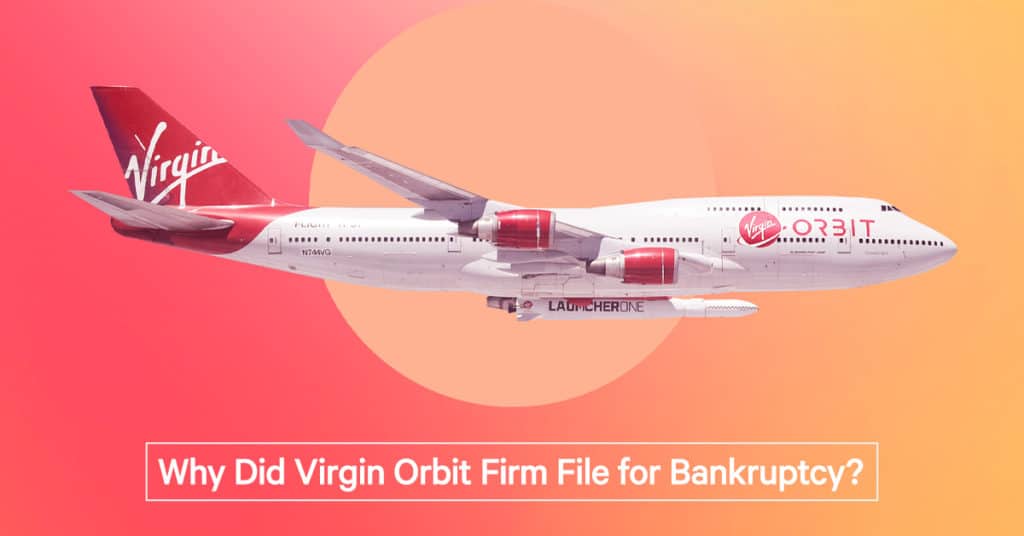There is no doubt that many businesses struggle and find themselves in hard financial times for many different reasons. Small businesses are more prone to becoming insolvent but it happens to larger organisations as well, as can be seen in the recent news that Virgin Orbit Holdings have recently filed for bankruptcy under Chapter 11. The business was originally founded by the billionaire Richard Branson and filed for bankruptcy given they were unable to secure any kind of long-term funding after a launch in January proved unsuccessful.
The filing is sudden, given it comes only two years after Virgin Orbit originally went public. It was previously valued at $3 billion but this valuation went down massively following the failed launch at the beginning of 2023.
Dan Hart, the Virgin Orbit Chief Executive commented on the news saying, “We believe that the Chapter 11 process represents the best path forward to identify and finalise an efficient and value-maximising sale.” The company was a spin-off from Virgin Galactic, which was a firm centred around space tourism. Virgin Orbit instead focused on sending satellites into orbit, rather than sending people.
When the news was announced, it was made public that the company would be seeking a sale of its assets and also announced that they would be laying off 750 employees (which is 85% of the workforce as a whole). In selling the assets, they were listed for $243 million. This could be an issue given the business has been valued at $65 million, with shares only being sold at 15 cents apiece.
So, where did Virgin Orbit go wrong? And What has led to the filing for bankruptcy?
The Failed Launch
One of the major issues that has impacted the business is the failed launch. In January, the sixth mission of the company began, which was where its centrepiece LauncherOne rocket (the first launched from Britain), failed to reach orbit. This meant that the payload it was carrying (which consisted of commercial and defence-related research satellites) was plunged into the ocean, rendering them useless.
This problem meant that the Spaceport based in Cornwall needed to halt operations and also furlough nearly every member of staff in order to conserve cash. The former Chief Operating Officer of Virgin Orbit, Tony Gingiss, had to apologise to employees in an email, saying that company leadership should have had more time to keep the company running.
He said, “I’m sorry we didn’t act sooner and avoid surprising you… I’m sorry that I was not able to convince our leader and board to take a different path to give us more time to figure things out.”
The Business Model
Another issue was the business model of the company. Originally, Virgin Orbit was set up in order to launch small rockets and be able to provide short-notice launches from anywhere in the world, which included launches needed for tactical military purposes. Whilst this could work in theory, there was increased demand for larger rocket launches. Not to mention, the cost-effective launches done by SpaceX and their Falcon 9 over the past couple of years meant that competition was fierce. Additionally, the cost of capital has increased over the past few years because of increased global interest, meaning venture investments into space-related start-ups have dropped over 50%.
Dan Hart commented on this in a court declaration. “The changing capital markets and higher interest rate environment made obtaining new capital difficult,” he said, whilst also acknowledging that the company is experiencing, “heavy pricing pressure from well-capitalised competitors in the commercial launch market.”
The Funding
Finally, another major issue was the fact that Virgin Orbit was unable to obtain any kind of funding moving forward. About 75% of the company is owned by Branson’s Virgin Group. They said that they had invested over $1 billion in the unit as a whole, which included $60 million in secured loans that were obtained in November. Another big investor in the company was Mubadala, Abu Dhabi’s sovereign wealth fund, which had a 17.9% stake.
Whilst Virgin Orbit currently looks for a buyer, Virgin Investments will help out by providing $31.6 million. Though the company has laid off a number of people, they have kept on about 100 employees so that operations can continue whilst it finds a rescuer, according to a regulatory filing.
Branson has had a lot of success with his telecommunications and his travel businesses; however, he has also been associated with a large number of high-profile business failures throughout his career which dates back to the 1970s.
One of the largest creditors which were a part of Virgin Orbit was the London-based company Arqit Ltd, who are now owed around $10 million for various services and as part of a customer deposit. They refused to provide any kind of comment on the current situation with Virgin Orbit.
Another large creditor who was involved with Virgin Orbit was the American Military, who are now owed about $6.8 million as a deposit which was put down for future launches. Again, no immediate comment has been made regarding the situation with Virgin Orbit.
Does Your Business Need Help?
As can be seen from the above, it is not just small businesses that are prone to going insolvent and filing for bankruptcy, there are large, billion-dollar companies who find themselves in a difficult position as well. As such, if you have your own small business and find yourself in difficult financial times, then there is nothing wrong with reaching out for help. When you do this, you need to ensure that you are working with people who have both your business and your creditor’s best interests in mind. At Simple Liquidation, our team of experts will sit down with you to better understand exactly what the current situation with your business is, and what your best move forward is. If you require any further information or have any questions then do not hesitate to get in touch.




